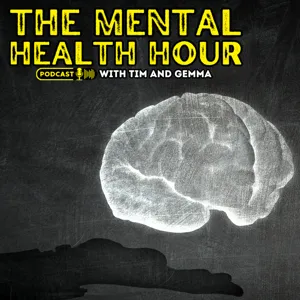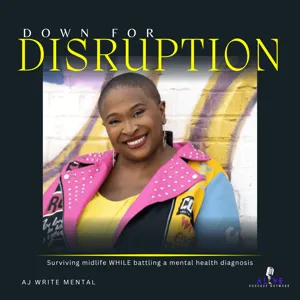Podcast Summary
Understanding the Difference Between Casual and Clinical Depression: Clinical depression is a serious condition with multiple depressive episodes impacting daily life, requiring professional help, while casual use of 'depressed' refers to feeling sad or down.
While it's common for people to use the term "depressed" casually to describe feeling sad or down, clinical depression is a more serious condition that requires proper diagnosis and treatment. During this episode of Being Well, Forrest Hanson and Dr. Rick Hansen delve deeper into the topic of depression, providing context on the sensitivity of the subject matter and emphasizing the importance of seeking professional help if you believe you may be experiencing clinical depression. They also clarify that the episodes in their series are meant to demystify these concepts and offer practical tools, but not as a replacement for a proper diagnosis. The discussion covers the difference between casual and clinical definitions of depression and outlines the diagnostic criteria for a major depressive episode. Clinical depression is characterized by multiple episodes of depressive symptoms, which can significantly impact a person's daily life and overall well-being. It's essential to approach these topics with care and understanding, recognizing the depth and complexity of depression and the importance of seeking help when needed.
Understanding Depression: More Than Just Feeling Sad: Depression is a persistent mood disorder affecting 6-7% of adults in the US annually, characterized by unhappiness, despair, and hopelessness, and can be caused by physical illness. Diagnostic criteria include depressed mood, loss of interest, and other symptoms.
Depression goes beyond feeling sad and is a persistent mood characterized by a significant sense of unhappiness, despair, and hopelessness. It's common, affecting around 6-7% of adults in the US each year, and even more worldwide. Depression can be caused by physical illness and can result in a lack of capacity to feel good, even when something positive happens. The diagnostic criteria for depression include experiencing five or more symptoms for two weeks or more, including depressed mood, loss of interest in activities, and other symptoms. It's important to remember that depression is a spectrum, and even if someone doesn't meet the full diagnostic criteria, the information shared here can still be helpful. Depression is common, and many people either experience it themselves or know someone who does.
Understanding Depression's Symptoms: Depression involves persistent sadness, loss of interest, weight changes, slowed thoughts and movements, fatigue, worthlessness, concentration difficulties, and thoughts of death or suicide for a minimum of two weeks.
Depression is more than just feeling sad or having a bad day. According to the DSM-5, it involves a persistent depressed mood most of the day, nearly every day, along with markedly diminished interest or pleasure in activities, significant weight loss or gain, a slowing down of thought and physical movement, fatigue or loss of energy, feelings of worthlessness or excessive guilt, diminished ability to think or concentrate, and recurrent thoughts of death or suicide. These symptoms must be present for a minimum of two weeks for a diagnosis of depression. Depression can significantly impact a person's daily life and relationships, and it's important to ask if someone is experiencing thoughts of death or suicide if you or they suspect depression. Depression is a serious condition that requires professional help.
Understanding Depression: Symptoms and Compassion: Depression is a serious mental health issue with symptoms lasting over two weeks, requiring professional attention. Self-compassion and support are crucial for those dealing with it, but it can be challenging for loved ones as well.
Clinical depression is more than just feeling sad or having a bad day. According to the expert, if someone has been experiencing five or more symptoms of depression for two weeks or more, it's a serious issue that requires attention. Ordinary interventions like exercise, relaxation, or positive thinking may not make a difference, and it can be challenging for those around the person to offer support. It's important to have compassion for both the depressed person and for oneself in this situation. Depression can wear on relationships and be a significant challenge for all involved. In the next part of the episode, they will discuss interventions and ways to support someone dealing with depression, but during this process, it's crucial to have compassion for oneself as well. The expert also mentioned that they would discuss sadness, stress, oppression, and grief in the upcoming episodes.
Understanding the Difference Between Sadness and Depression: Depression is persistent mood affecting daily life, beyond normal sadness. Listen, validate experiences, regardless of formal criteria.
While sadness is a feeling that comes and goes, depression is a persistent mood or climate that affects a person's daily life. Although sadness and depression can co-occur, clinical depression is characterized by specific symptoms that go beyond normal sadness. It's important to remember that even if someone doesn't meet the full criteria for clinical depression, they may still be experiencing something worth exploring on the spectrum of depression. Misunderstanding and disrespecting those who are experiencing clinical depression can be a result of not having experienced it oneself. The distinction between sadness and depression can be nuanced, and it's crucial to respect the full spectrum of possibility while acknowledging the differences. Ultimately, if someone expresses feeling down and out, it's essential to listen and validate their experience, regardless of whether it fits the formal criteria for clinical depression.
Maintaining Mental and Physical Health: Separating Fact from Fiction and Seeking Support: Seek accurate info, use simple solutions, and find support for mental and physical wellness.
Mental health is a complex issue that can involve chronic low-grade sadness as well as occasional severe episodes of clinical depression. These conditions can coexist and be influenced by various factors, including anxiety. Mental health struggles can significantly impact one's overall well-being and daily life. To help maintain physical health and overall wellness, it's essential to separate fact from fiction and seek reliable resources. Podcasts like the ZOE Science and Nutrition podcast offer valuable information and insights from world-leading scientists. Additionally, there are simple and effective solutions for addressing specific concerns, such as the OS01 face topical peptide from OneSkin for skin health. When dealing with emotional challenges, it's helpful to have practical and direct guidance. The Doctor John DeLaney Show provides a supportive platform for individuals to navigate their struggles and find solutions to common challenges related to relationships, anxieties, and emotional well-being. In conclusion, taking care of your mental and physical health involves seeking accurate information, implementing simple and effective solutions, and having a supportive community to lean on during challenging times.
Distinguishing Between Different Types of Depression: Understanding the spectrum of depression and recognizing the importance of accurate diagnosis and appropriate interventions for various forms of depression, including bipolar disorder and coping mechanisms, is crucial for overall well-being.
Understanding and distinguishing between different types of depression and negative moods can be a complex and challenging task. Depression exists on a spectrum, ranging from low grade to severe clinical depression, and there are also conditions like bipolar disorder that involve periods of manic episodes. These various forms of depression may require different interventions, making it important to accurately diagnose and distinguish between them. Additionally, some people may use short-term coping mechanisms to push away sadness and depression, but if these defenses are removed, the underlying sadness may resurface. It's essential to consider the long-term consequences of these coping mechanisms and the potential impact on overall well-being.
Understanding Depression's Complex Causes: Depression's causes are complex, involving both physiological factors like underlying medical conditions and non-heritable causes such as situational factors and psychological states.
Depression is a complex condition with both physiological and environmental causes. Physiologically, depressed mood can be a symptom of underlying medical conditions, even those that are subclinical or not yet diagnosed. For instance, low iron levels, which may not cause anemia, can impact mood and energy levels. Psychologically, depression can resemble the symptoms of grief or mourning, and situational factors like poverty, injustice, discrimination, prejudice, assault, trauma, and stress can also contribute to depression. Research suggests that on average, there is a loose balance between heritable and non-heritable causes, with approximately 40-60% of the cause being non-heritable. So, it's crucial to consider both physiological and environmental factors when understanding the causes of depression.
Genetics and Depression: Complex Influences: Genetics may increase depression risk, but environmental and psychological factors also play significant roles in mental health.
Having a close family member with a history of clinical depression may increase a person's risk of experiencing depression themselves. This genetic link is complex and still being researched, with some studies suggesting multiple genes may contribute. It's essential to remember that while genetics play a role, environmental and psychological factors also significantly impact mental health. Imagining the mind as an interior landscape can help understand this concept. When we slow down and consider our true selves, we may discover various "characters" within us. Some may be supportive, offering perspective, hope, and nurturing. Others might be malevolent, mean, shaming, or even treacherous. The presence of a family member with depression may influence the landscape of our inner world, but it's crucial to remember that we have the power to interact with these characters and shape our mental health through various means. It's important to remember that research in this field is ongoing, and our understanding of depression's causes is still evolving. While genetics may increase our risk, they do not determine our mental health outcomes. By acknowledging both our genetic and environmental influences, we can work towards creating a happier, healthier life.
Understanding Depression: Separating Fact from Feeling: Depression is distinct from sadness, blue mood, and grief, and recognizing this difference is crucial for effective intervention. The science behind depression offers context, but focusing on the subjective experience is vital for addressing depressive feelings.
The human psyche, represented by the wiggly and squiggly branch in the American Psychological Association's logo, holds the greatest mystery and importance in understanding mental health, particularly when it comes to depression. Depression is not a one-size-fits-all condition, and it's essential to distinguish it from other emotional states, such as sadness, blue mood, and grief. The science behind depression, including heritable and non-heritable factors, provides valuable context, but it's the subjective experience of being that truly matters. If the settled state of one's mind is an unhappy place, addressing that is crucial. In the upcoming episode, we will explore practical interventions to support oneself or a loved one dealing with depressive feelings. In this part of the episode, we drew useful distinctions between various emotional states and discussed the science and diagnostic criteria related to depression. If you find our podcast insightful, please consider subscribing, leaving a positive review, and sharing it with others to help us reach a broader audience.





